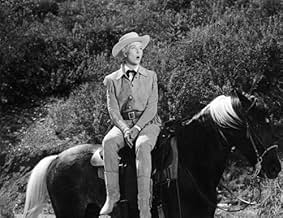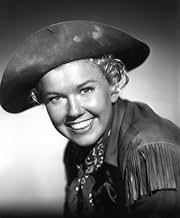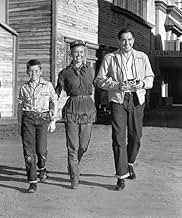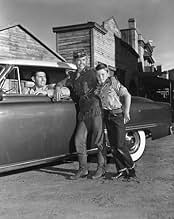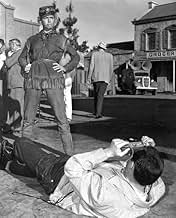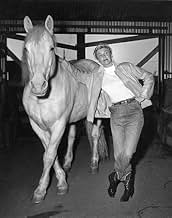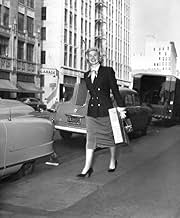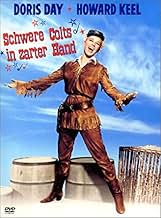IMDb RATING
7.2/10
12K
YOUR RATING
The story of Calamity Jane, her saloon, and her romance with Wild Bill Hickok.The story of Calamity Jane, her saloon, and her romance with Wild Bill Hickok.The story of Calamity Jane, her saloon, and her romance with Wild Bill Hickok.
- Won 1 Oscar
- 2 wins & 5 nominations total
Allyn Ann McLerie
- Katie Brown
- (as Allyn McLerie)
Victor Adamson
- Barfly
- (uncredited)
Fred Aldrich
- Chicagoan
- (uncredited)
Leon Alton
- Townsman
- (uncredited)
Monya Andre
- Woman at Fort Dance
- (uncredited)
Beulah Archuletta
- Indian Woman in Saloon Balcony
- (uncredited)
Emile Avery
- Barfly
- (uncredited)
Mary Bayless
- Woman at Fort Dance
- (uncredited)
George Bell
- Barfly
- (uncredited)
Ray Bennett
- Officer at Fort Dance
- (uncredited)
Arthur Berkeley
- Bartender
- (uncredited)
- Director
- Writer
- All cast & crew
- Production, box office & more at IMDbPro
Featured reviews
... who else could put across the Deadwoodstageis number like Doris Day in the opening sequences of this wonderful movie? Right through to her mushy ballad 'Secret Love' she is perfect for the role of the butch cowgirl who gets a feminine makeover and snares her shooting buddy (the excellent Howard Keel, in fine voice here). Doris was a true star, a great actress and singer, game for a laugh and a pretty blonde who transcended her rather trite public image through her talent. Calamity Jane is possibly her best work, and certainly one of the best musical movies of the 1950s (against some pretty stiff competition). They might be making musicals again, but they won't make them quite like this.
First and foremost, CALAMITY JANE is a fun musical. The 29-year-old Doris Day thoroughly enjoys herself in the central role as a gun-totin' tomboy, the fastest draw in the city of Deadwood, South Dakota - apart from Wild Bill Hickok (Howard Keel). She demonstrates an apparently limitless capacity for telling tall stories, as well as a unique ability to ride a horse. She and Keel make a lovable double-act, especially in their song "I Can Do Without You" - which is of course completely ironic in tone. They clearly cannot do without one another, as proved at the end of the film when they celebrate their nuptials. Sammy Fain and Paul Francis Webster's score contains at least two classics, "The Deadwood Stage (Whip Crack-Away," which opens and closes the film, and "Secret Love," a typically schmaltzy Day song that topped the charts on its initial release. Yet perhaps the film's most interesting aspect today is the way in which it embodies early Fifties attitudes towards gender. Calamity Jane's decision to don male attire is perceived as something aberrant; she is tolerated by her fellow-citizens of Deadwood, but no one really takes her very seriously. It is only when she is 'educated' in feminine ways by visiting singer Katie Brown (Allyn McLerie) that she understands what her 'proper' role should be. She should accept that females (unlike males) are capricious in nature, apt to make spontaneous decisions without rhyme or reason. In a ball scene towards the end of the film, Calamity appears in a long gown, her blonde hair neatly tied at the back - the male guests stare at her in disbelief, as if they cannot believe they have a "true" woman within their midst. Calamity feels uncomfortable in the role, and returns briefly to her male attire; but when the citizens refuse to speak to her later on (punishing her for her decision to banish Katie from their town), she understands the "error" of her ways. At the film's end she wears a bridal gown and tosses her six-shooter away, in symbolic acknowledgment that she should no longer try to adopt masculine attitudes. Rather she should accept her designated role as wife and (probably) mother.
Doris Day plays an unrefined tomboy who is handy with a gun and learns about refinement on the way to finding romance and singing some hit songs. If that sounds like a rehash of 1950's successful "Annie Get Your Gun", it's probably no coincidence. And both starred Howard Keel as the male lead.
Even if "Calamity Jane" can't match the array of notable, classic tunes that "Annie Get Your Gun" boasts, it can an stand on its own as a solid musical with songs by Sammy Fain and lyrics by Paul Francis Webster. In fact, the film relies mostly on its music and the wholesomely talented Miss Day to make its mark.
Ms. Day, besides displaying her usual enthusiasm while singing the film's musical numbers, including its best song "Secret Love", also plays the role of Calamity with a physicality that deserves special praise. Not only does she adapt a carriage that rings true for a woman who tries to be manlier than any man, but she also talks the talk and performs stunts that most actresses would hesitate to consider.
The other major female character, Katie Brown, is portrayed by Allyn Ann McLerie (in only her fourth screen credit). Ms. McLerie holds her own with Doris and has a presence that seems to portend more leading roles in her future.
Fans of fifties musicals should find what they're looking for in "Calamity Jane" unless they are seeking biographical truth.
Even if "Calamity Jane" can't match the array of notable, classic tunes that "Annie Get Your Gun" boasts, it can an stand on its own as a solid musical with songs by Sammy Fain and lyrics by Paul Francis Webster. In fact, the film relies mostly on its music and the wholesomely talented Miss Day to make its mark.
Ms. Day, besides displaying her usual enthusiasm while singing the film's musical numbers, including its best song "Secret Love", also plays the role of Calamity with a physicality that deserves special praise. Not only does she adapt a carriage that rings true for a woman who tries to be manlier than any man, but she also talks the talk and performs stunts that most actresses would hesitate to consider.
The other major female character, Katie Brown, is portrayed by Allyn Ann McLerie (in only her fourth screen credit). Ms. McLerie holds her own with Doris and has a presence that seems to portend more leading roles in her future.
Fans of fifties musicals should find what they're looking for in "Calamity Jane" unless they are seeking biographical truth.
The film is marvelous, but it's been dissected to death; consequently, I can't add any comment you haven't already heard. Lovely Technicolor cinematography of the outdoor frontier and rich period costuming enhances this top-notch cornucopia of story, score, and songs- including 'The Deadwood Stage,' 'I Can Do Without You,' 'Windy City,' 'The Subject of Harry,' and 'Secret Love.' Two special moments for me are Howard Keel singing 'Higher Than A Hawk' to the portrait of Allyn McLerie, and 'A Woman's Touch,' which shows McLerie and Doris Day become sisters in solidarity. They clean the house (in fact, renovate it) while discovering Calamity's femininity at the same time. They joke, they bond, and at the end of the scene our heroine is in a dress and quite the looker. There's no shocking sexist message here; it's a musical showing how a woman gets her man. I don't think in 1953 you could've asked for more. On the other hand, most of Day's scenes with Keel are a locked-horns battle of the sexes- absolutely no question. They compliment each other beautifully- from 'I Can Do Without You', right up to their nearly romantic duet of 'The Black Hills of Dakota.' Enjoy the film again, and look between the lines- some of it is quite timeless.
`Calamity Jane' is a film I love to take from the shelves when I'm feeling blue. It's so exuberant, so joyous, and so colourful that it cannot help but cheer you up!
Doris Day plays the role of her career as the rambunctious `Calam', the wildcat tomboy of Deadwood City. The fun starts when Calamity is sent to the `windy city' of Chicago to find a vaudeville beauty who will perform at the local bar. Instead of the genuine article, Calamity ends up with the star's ambitious maid, Katie, who decides to make her stab at fame in the star's place. Together, the two find fun, love, and a whole lot of catchy tunes.
Sure, the fascinating real-life historical figure Calamity Jane didn't look much like Doris Day - let alone Howard Keel, who is the last person you'd describe as `wild' - and Jane's transformation from independent homesteader to blushing housewife isn't what you'd call P.C., but if you're looking for reality, head to the Martin Scorsese section. This is light-as-a-feather entertainment done very well, and I can't help but love it!
Doris Day plays the role of her career as the rambunctious `Calam', the wildcat tomboy of Deadwood City. The fun starts when Calamity is sent to the `windy city' of Chicago to find a vaudeville beauty who will perform at the local bar. Instead of the genuine article, Calamity ends up with the star's ambitious maid, Katie, who decides to make her stab at fame in the star's place. Together, the two find fun, love, and a whole lot of catchy tunes.
Sure, the fascinating real-life historical figure Calamity Jane didn't look much like Doris Day - let alone Howard Keel, who is the last person you'd describe as `wild' - and Jane's transformation from independent homesteader to blushing housewife isn't what you'd call P.C., but if you're looking for reality, head to the Martin Scorsese section. This is light-as-a-feather entertainment done very well, and I can't help but love it!
Did you know
- GoofsAfter leaving the ball at the fort, we cut to a shot of Calamity's bare back as she is undressing. Once she gets the dress off she is shown wearing undergarments that clearly cover most of her back.
- Quotes
[the singer is a man in drag]
Wild Bill Hickok: She ain't very good lookin'
Calamity Jane: That ain't all she ain't.
- Alternate versionsThere is an Italian edition of this film on DVD, distributed by DNA Srl: "AMORE SOTTO COPERTA (1948) + CALAMITY JANE (Non sparare baciami, 1953)" (2 Films on a single DVD), re-edited with the contribution of film historian Riccardo Cusin. This version is also available for streaming on some platforms.
- ConnectionsFeatured in The Doris Mary Anne Kappelhoff Special (1971)
- SoundtracksThe Deadwood Stage (Whip-Crack-Away)
Written by Sammy Fain
Lyrics by Paul Francis Webster
Sung and whistled by chorus behind credits, then sung by Doris Day and chorus
Details
Box office
- Gross worldwide
- $9,215
- Runtime1 hour 41 minutes
- Aspect ratio
- 1.37 : 1
Contribute to this page
Suggest an edit or add missing content



